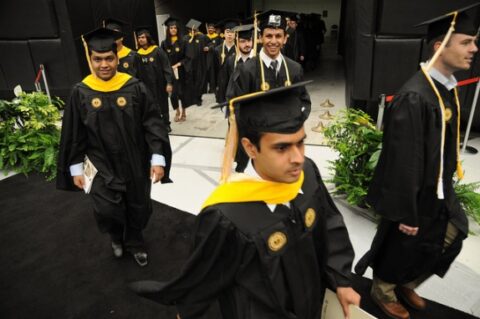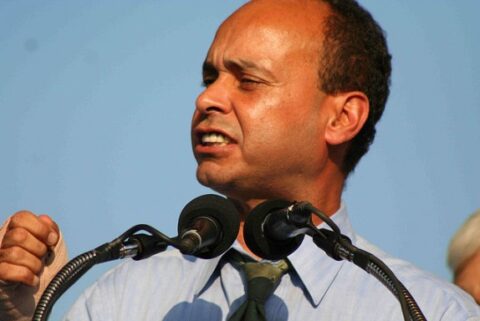Reform

Pending a Resolution of DOMA, Immigration Judges Should Exercise Discretion to Stay Removal Cases
BY BETH WERLIN AND VICTORIA NEILSON To date, five states plus the District of Columbia celebrate marriages of gay and lesbian couples and several other states honor such marriages. In addition, five countries, including Canada, permit marriages of gay and lesbian couples and at least fourteen additional countries recognize same-sex relationships for immigration purposes. Yet, because the U.S. immigration agencies rely on section 3 of the Defense of Marriage Act (DOMA)—defining marriage as a union between one man and one woman—lesbian and gay U.S. citizens and lawful permanent residents are barred from obtaining immigrant visas for their spouses, visas that are available to heterosexual U.S. citizens and residents with foreign-born spouses. Gay and lesbian noncitizens also are precluded from obtaining other immigration protections, including relief from removal, based on a marriage to a U.S. citizen or permanent resident. As a result, families are separated and spouses of U.S. citizens and lawful permanent residents are deported from the United States. Read More

More States Question Participation in ICE’s Secure Communities Program
Colorado Gov. John Hickenlooper questions state's participation in Secure Communities program Earlier this week, Massachusetts Governor Deval Patrick announced that the state of Massachusetts would not sign an agreement with the Department of Homeland Security to participate in the Secure Communities program, making it the third state in recent weeks to question participation in the controversial enforcement program. That chorus of concern, however, grew louder this week as Colorado Governor John Hickenlooper questioned whether the program—which shares the fingerprints of individuals booked into local jails with federal immigration databases—is being implemented properly in Colorado. Also this week, the Los Angeles City Council voted to support a resolution that allows communities to opt-out of Secure Communities, which many argue is targeting a broader swath of people than the dangerous criminals the program states as its intended target. Read More

Administration Uses Executive Authority to Keep Educated Grads in U.S. Longer
By H. BOB SAKANIWA, AMERICAN IMMIGRATION LAWYER'S ASSOCIATION As President Obama indicated in an immigration speech in El Paso, Texas, earlier this month, in a global marketplace, the United States needs the best and brightest to stay in our country to work, innovate and help create jobs for the benefit of all Americans. Well-educated, foreign-born professionals have made enormous contributions to our country, and we should do all we can to retain the next generation of these types of contributors. Just two days after President Obama put the topic of immigration reform back into the national debate, the administration exercised its executive authority to expand the number of science, technology, engineering, and math degree (STEM) programs that can be used to qualify foreign graduates to extend their post-graduate training. Read More

White House Immigration Blueprint a Starting Point
Speeches, even those delivered by the President of the United States, can be forgotten fairly quickly. Following the El Paso immigration speech from two weeks ago, the White House is attempting to sustain a buzz by sending other members of the President’s cabinet and White House officials out to give speeches and hold roundtables across the country to discuss immigration. The most lasting piece of this effort, however, is likely to be the immigration blueprint which was released along with the speech. The title, “Building a 21st Century Immigration System” recognizes that the system we have now does not work—and a new one must be built from scratch to meet the needs of our country today. Without comprehensive reform, pieces of the immigration system will remain unfixed, resulting in a system which still does not function Read More

Immigrant Community Needs White House Muscle to Move Immigration, Politics and All
Plenty of people are calling this week's events—especially the President’s speech on immigration in El Paso—pure politics. And some are rightly criticizing Administration policies—such as record levels of deportations—as inconsistent with the broader vision of immigration and economic prosperity the President outlined in El Paso. But placed in a broader strategic context, the El Paso speech moves the President’s strategy for immigration reform forward by utilizing the messages and tools that carried Barack Obama into the White House and helped him win his signature healthcare reforms. Read More

President Obama’s Speech on Immigration: Campaign Politics or a Call to Action?
Today in El Paso, President Obama delivered his second major speech dedicated to fixing our broken immigration system. The President addressed some of the major obstacles to passing comprehensive reform—namely the “border-first” crowd’s repeated claim that the Administration hasn’t done enough to secure the border—by touting the record level of resources invested along the border. The President also framed the need for reform as an economic imperative, highlighting the benefits of reform for America's middle class and for America’s ability to compete in the global economy. But the major takeaway from the President’s speech today was the President’s call to action. Read More

Congressional Hispanic Caucus Asks President to Untie Hands and Help Immigrant Groups
In his latest effort to drum up bipartisan support for immigration reform in Congress, President Obama met with the Congressional Hispanic Caucus (CHC) yesterday at the White House. Similar to other meetings in recent weeks (with national and state leaders, Latino celebrities and an immigration-themed commencement speech at Miami-Dade College), the President reiterated that his hands are tied on reform without Congressional action. But in yesterday’s meeting, the CHC asked the President to untie his hands and “use the administrative powers he has under existing law to provide relief to certain groups of immigrants facing deportation.” Read More

House Subcommittee Hearing Highlights U.S. Need for Foreign Scientists and Engineers
Today, a House Immigration Subcommittee hearing underscored the U.S. economy’s reliance on scientists and engineers from abroad. The hearing, entitled “H-1B Visas: Designing a Program to Meet the Needs of the U.S. Economy and U.S. Workers,” was characterized by considerable disagreement among witnesses and subcommittee members as to how the H-1B program for highly skilled foreign professionals should best be structured in terms of wage protections and job portability. But virtually everyone, including Subcommittee Chairman Elton Gallegly (R-24th/CA) and Judiciary Committee Chairman Lamar Smith (R-21st/TX), agreed that foreign-born scientists and engineers, including many who come to the United States on H-1B visas, make critical contributions to the U.S. economy. Read More

Republicans Attempt to Change Outgoing Message on Immigration, Again
This week, the conflicting messaging on immigration from Republican politicians is particularly hard to follow. Voters can “press one” for Senator Lindsay Graham’s message that immigration reform is reality if we just pass a border bill; “press two” for Senator Orrin Hatch’s message that Utah voters want to welcome immigrants by stopping them from coming; or “press three” for House Republicans’ message that DHS shouldn’t spend any money on immigrant integration. While the first option at least acknowledges the importance of the growing immigrant voting bloc, the other two options do not. Read More

Will Senators Graham and Schumer Commit to Immigration Reform this Time Around?
Senator Lindsey Graham (R-SC). Photo by Chairman of the Joint Chiefs of Staff. This week, Politico reported on the on-again off-again relationship between Senators Lindsey Graham (R-SC) and Chuck Schumer (D-NY) on immigration. Apparently, it’s on-again, with both Schumer and Graham telling reporters and contacts that they are back at the negotiating table. Lest we get too excited, we shouldn’t forget that we’ve been down this path before. Read More
Make a contribution
Make a direct impact on the lives of immigrants.
